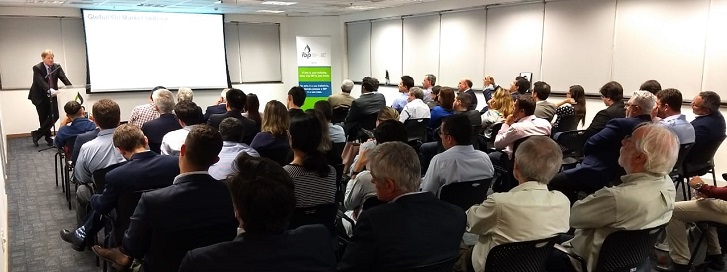Debate sobre as tendências do mercado de energia em 2019 abre o calendário de eventos

O Instituto Brasileiro de Petróleo, Gás e Biocombustíveis (IBP), em parceria com a S&P Global-Platts – fornecedora independente de informações, preços de referência para os mercados de energia e commodities – e com a PwC – prestadora de serviços profissionais nas áreas de auditoria e consultoria – realizou uma série de eventos exclusivos para jovens profissionais e associados IBP, para apresentar tendências e reflexões sobre o setor de petróleo e gás para o ano de 2019, como a transição energética e os impactos das tendências tecnológicas para o mercado de trabalho.
De acordo com o secretário geral do IBP, Milton Costa Filho, uma das prioridades do instituto é fornecer suporte para a agenda prioritária da indústria, fomentando o debate sobre a transição energética e seus impactos para o mercado e para as empresas. “Óleo e gás ainda são importantes fontes de energia para as demandas globais, porém, nós sabemos que no futuro teremos uma diversidade de fontes de energia. Por isso, considerando o futuro do nosso país, uma das prioridades do IBP é acelerar a produção do pré-sal e usar todos os seus recursos para estabelecer uma nova matriz energética para o Brasil”, destacou Milton.
Café com Associados
Os desafios e impactos para as empresas de óleo e gás num cenário de transição energética foi o tema do café da manhã exclusivo para associados do IBP, realizado no dia 04 de fevereiro, na sede do instituto. Com a presença de Kenny Hawsey, Global Energy Tax Leader da PwC e Øistein Johannessen, Head of Communications da Equinor, o objetivo do evento foi reunir executivos de diversas companhias da indústria de petróleo e gás, do Brasil e do mundo, para compartilhar conhecimento e discutir as mudanças no mercado a partir do desafio da transição energética.
A mudança estratégica das empresas de óleo e gás em resposta à transição energética, incorporando as energias renováveis ao seu portfólio, precisa ser amadurecida internamente e desenvolvida de acordo com a expertise da companhia, conforme explicou Øistein Johannessen, citando o exemplo da Equinor. O executivo fez um alerta a respeito do futuro das empresas de petróleo e gás. “Nós vamos ver um aumento do uso de óleo e gás em eletricidade e uma redução de hidrocarbonetos em transporte, definitivamente. Vamos ver regulações mais restritas, altas barreiras de carbono. Nós temos que reduzir nossas emissões de carbono para ser mais competitivo”, finalizou.
Debate com público jovem
Jovens profissionais do setor e estudantes se reuniram para um bate-papo com Kenny Hawsey, Global Energy Tax Leader da PwC. Parceria entre o IBP e a PwC, o encontro teve como tema “Tributos Globais e Tendências de Tecnologia no Setor de Energia” e buscou dar ao público jovem novas perspectivas sobre os impactos que as tendências tecnológicas trariam para o mercado de trabalho.
Segundo o executivo, o que mais fará diferença no trabalho dos jovens, nos próximos 5 anos, será a tecnologia. Para ele, o avanço tecnológico não representa obrigatoriamente a perda de postos de trabalho, mas, sim, uma mudança na forma de trabalhar, de viver e de operar.
Hawsey ainda enfatizou a necessidade de constante aprimoramento, especialmente o digital, como forma de se distinguir, e de disrupção. “Todos os dias, precisamos nos desafiar. Como faço as coisas de maneira diferente? Como faço as coisas melhor? Porque, se eu não descobrir, outra pessoa vai descobrir e forçar mudanças em mim. Pensem em disrupção. Pense em como cada um de vocês vai continuar a se aprimorar”, aconselhou.
Global Oil Outlook 2019
Em um evento exclusivo para associados, o IBP em parceria com a S&P Global Platts, realizou o Global Oil Outlook 2019 – para apresentar as últimas tendências e reflexões sobre o setor de petróleo e gás para o ano de 2019. Mark Schwartz, diretor de estratégia da S&P Global Platts, abordou as perspectivas sobre o mercado global de petróleo, bem como percepções sobre o mercado na América Latina.
“O momento para realização de um evento como esse não poderia ser melhor ou mais apropriado. A indústria de petróleo e gás brasileira experimenta hoje um período de complexas mudanças e oportunidades políticas que não é visto desde o final dos anos 90”, disse Alberto Guimarães, secretário executivo de Downstream do IBP. “O IBP, em parceria com as autoridades e demais agentes do setor, atua para criar um ambiente adequado e seguro para atrair investimentos, permitindo que o Brasil desenvolva suas grandes reservas produtoras de petróleo”, complementa.
Outro aspecto apresentado por Schwartz foi o impacto da nova regulação da Organização Marítima Internacional (IMO, na sigla em inglês), que entra em vigor em 2020, nos mercados globais de petróleo e produtos refinados. Segundo ele, as especificações globais de combustível naval serão mais rígidas a partir do próximo ano, forçando mudanças disruptivas dentro e fora da indústria petrolífera.
“As mudanças nas especificações acontecerão apesar dos contra-argumentos, ou seja, é improvável que a nova regulação seja adiada. O nosso entendimento é que a indústria irá atender as novas regras, pois múltiplas forças impulsionarão maior conformidade”, disse Schwartz.